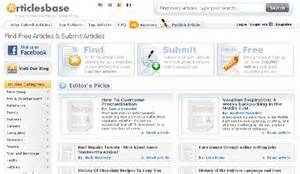 |
| Creative Commons image |
The method described in the video is nothing like generating instant blog posts for your blog, in that it relies almost solely on your network and your networks' network to visit your article directory, generate buzz, and create comments.
The author uses notepad to type out the instructions, and is sometimes prone to miss spelled words - but if you will look past the media to the content, you can have your own fully functioning article directory up and running in as little as 30 minutes!
How Does It Work?
What is particularly interesting is that there is no shortage of niche topics you can ascribe to, and even more important, once you advertise your article directory on your favorite social media sites, forums, Facebook friends, etc., you will have no shortage of aspiring authors looking to add value to the niche. Your network will include those most interested and involved in the niche, and as a result they can provide quality articles and insights for others in the niche. This is a win-win since they will get the exposure and credit for their ideas, tips, insights, etc., and you will get value drive fresh content for your article directory!
How Will Others Find My Directory?
In its simplest form, this is multiplication using the domino effect.
You => then Your Network => then Your Networks' Network => and so on.
Driving traffic to your article directory then become almost instantaneous, since everyone who publishes to your directory, will themselves have an exclusive network of friends, family, acquaintances, and others. As they share their newly published articles with them and ask that they visit and comment on it, their network will naturally pass the request and information on the site on to others within their exclusive network. The organic traffic they drive to your article directory will multiply exponentially, as others consume the content and consider adding their own publishable work to your directory.
Other Ways to Generate Traffic?
As I alluded to earlier, you could always approach traffic generation in the same manner that people have been successfully doing for years - blogging! The great thing about blogging is that regardless of the topic for the blog, you can always insert ads to your article directory at the end of the article, or on the sides of your blog. Even better, you can create a host of free blogs, and populate them with continuous content using tools such as Instant Blog Submitter, among others.
(full disclosure - if you sign up for this product I will earn a small fee from them)
 So Where is the Passive Income?
So Where is the Passive Income?You won't gain real passive income unless you have an active and engaged director with members, authors, and visitors re-posting content, Tweeting and re-tweeting articles, sharing across the spectrum of social media. Once that begin to occur there are several strategies you can use to draw income from the site, including AdSense, selling ad space on your sight, adding affiliate marketing products, etc. A great resource you should visit to get more ideas on how to monetize your site is Pat Flynn's Smart Passive Income. You can read his blog, listen to his podcasts, and pilfer through his list of resources for free! And if you'd let him know you found his site by visiting mine, that would be awesome!
You now have all the tools you need to create your own article directory in 30 minutes or less, and start the process of generating passive income from it. I would love to feature your article directory on my hub site, Leadership, Coaching, and Mentoring and share your success story with the world!
Good luck and great hunting!







